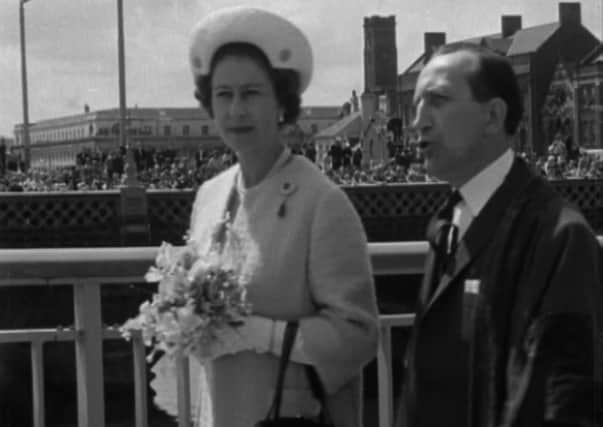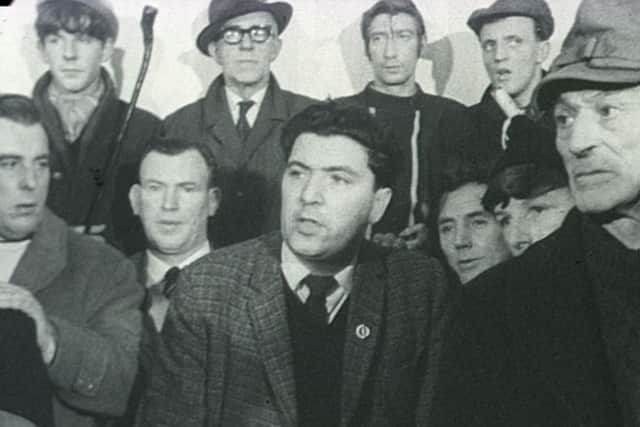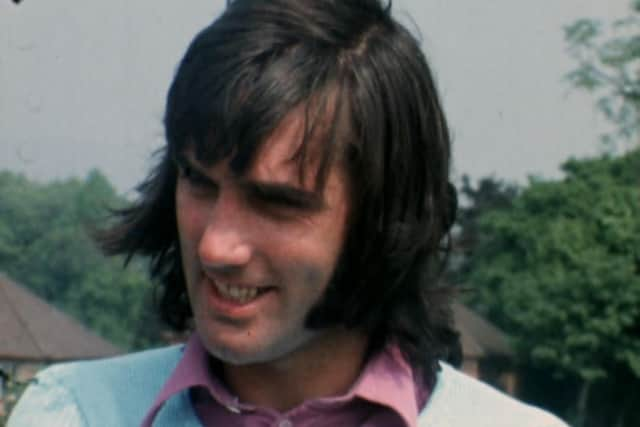Rewind: BBC NI launches extensive archive of video footage from the hard-hitting to the bizarre


For the past four years a team of archivists at the BBC have been putting together a website which includes news reports, documentaries and lifestyle programmes from Northern Ireland in the 1950s, ‘60s and ‘70s.
More than 13,000 clips, originally broadcast on BBC NI, ranging from the hard-hitting to the bizarre, are now available to view.
Advertisement
Hide AdAdvertisement
Hide AdLast week I got a preview of the website and had a chance to delve through the archives.


Having always been attracted to stories off the beaten track I enjoyed watching some of James Boyce’s reports.
The reporter for the ‘Six Five’ programme has an unconventional, yet brilliant way of presenting his stories, some of which you’d be forgiven for thinking are comedy sketches given the larger than life characters he speaks to.
He travels to Gortin, Co Tyrone in the 1960s to buy a pipe then talks to Mary Ward, one of a “swiftly vanishing race” of lady pipe smokers.
Advertisement
Hide AdAdvertisement
Hide AdShe is unable to read and lives alone with her three cats and a dog in Ballynasollus.


“All the comfort I have is the smoking of the old clay pipe,” she tells him as they sit by a roaring fire.
He also reports on an old countryman from Ederney in Co Fermanagh who he goes to see to cure a sprained ankle. Strangely he is not allowed to thank him or the cure won’t work.
These lighter stories are included in the Rewind archive along with some Troubles’ footage which viewers may find distressing.
Advertisement
Hide AdAdvertisement
Hide AdFor that reason the site requires you to register then sign in and set your preferences as to whether you wish to include the clips which have the potential to cause alarm.
The Rewind website is introduced by actor Conleth Hill who says: “What you’re watching is from the past, you might not expect to hear some of the language used or the attitudes expressed on the BBC today, but history hasn’t been rewritten, you’re going to see things exactly as they were broadcast at the time.
“Some edits had to be made due to legal reasons or the graphic or highly sensitive nature of the content. These have been kept to a minimum and only made after lots of consultation.”
Executive editor for the project Andy Martin explained further: “There’s very little censorship, all of the material still exists and will be used in the future.
Advertisement
Hide AdAdvertisement
Hide Ad“For a tiny proportion of clips we’ve made some sensitivity judgements based on long, long conversations with victims and survivors groups and various other groups about what they felt was the appropriate way to approach this for something that is permanently available.”
Andy explained the origins of Rewind: “About three or four years ago BBC Northern Ireland started on a really extensive digitisation project. Our director Peter Johnston took the view that there’s no point in a digitised archive and getting it off all those old formats if you’re never actually going to use it.”
To deliver the project an editorial unit and a team of developers were put together.
Andy said: “A whole new platform has been built and what we believe actually is one of, if not the, world leading audio visual archive search platform.
Advertisement
Hide AdAdvertisement
Hide Ad“We’re not naive, we know our archive only goes back to the 1950s, it’s nothing like the archive that newspapers have, but there is a lot of it, there’s a lot of television, a lot of news. A lot of the stuff is really rich and tells us a lot about our past.
“We really hope this will be a really useful tool for journalists, for schools, for academics, and for anyone who has an interest in the history of this place. There are bits and pieces in there about its folklore, how Northern Ireland has changed, the changes in attitude and, indeed, in culture.”
Leader of the editorial team is Helen Toland, who gave me a demonstration of some of the site’s features.
She said: “You can search by location, subject, dates, or a name. A lot of people search for their name or where they live. There’s a good chance you’ll see somebody you know in at least one of the clips.”
Advertisement
Hide AdAdvertisement
Hide AdRewind also includes interactive photographs of NI places where you can drag your cursor over the image to see the past change to the present. Helen said: “We’ve about 25 of those, once lockdown restrictions are lifted we’ll be able to go out and do some more.”
The landmark initiative will make a large and diverse cross-section of the BBC’s archive publicly accessible for the first time.
It is intended to be accessed as an academic and research tool and may also appeal to those who wish to catch a glimpse of what life was like in Northern Ireland, as captured by BBC NI, during the ‘50s, ‘60s and ‘70s.
Helen said: “There’s so much material on the site you could easily get lost in it. That’s what we’re hoping.
Advertisement
Hide AdAdvertisement
Hide Ad“No matter what you’re interested in, and no matter what age you are – as long as you’re over 16 - we feel that there’s something there for people to get very excited about and want to pass on.”
At present, Rewind enables users to view content from the 1950s to the 1970s – much of it unavailable since original broadcast.
Helen said: “Every single asset that is on the site has been viewed at least twice, so there’s been a lot of TV watched.
“There are hundreds and hundreds of hours of footage on this.
Advertisement
Hide AdAdvertisement
Hide Ad“No one has taken on a project this size in the BBC before, but we feel that it is important to allow people to see the content that ultimately belongs to them.”
Visitors to Rewind are required to register before accessing any of the archive clips.
Helen said: “You have to sign in so you can’t just happen on the clips. We’re very aware there is a lot of footage here from the Troubles and we wanted to make sure people couldn’t just stumble upon it unexpectly.
“That’s why we’re asking people to sign in and choose their level of guidance.”
Advertisement
Hide AdAdvertisement
Hide AdAndy added: “We hope that what we’re attempting to pioneer here will be useful to other parts of the BBC in the future.
“It’s a brilliant gift to say to the people who have paid for this over the years, ‘here it is, you can enjoy it again’.”
Director of BBC NI Peter Johnston said: “This evolving archive resource has relevance for many people, providing fresh insights, forgotten stories and the documentation of Northern Ireland’s past.
“The teams involved have created an important academic resource that combines the power of new technology and the richness of the BBC’s archive for all those interested in finding out more about Northern Ireland throughout the decades.”
Advertisement
Hide AdAdvertisement
Hide AdWork is under way to open up more of the archive from the 1980s and 1990s and additional material on the portal will be released on a phased basis.
The portal is available from 9am today at www.bbc.co.uk/rewind
The launch of the new portal will be accompanied by the television programme Rewind The Scenes on BBC One Northern Ireland tonight at 11.45pm and afterwards on BBC iPlayer.
The programme takes a look through some of the archive with the help of members of the audience from all ages to watch their reactions to the historical, political and quirky stories of the time.
Advertisement
Hide AdAdvertisement
Hide AdViewers will see how the invited audience react to a visit by Her Majesty Queen to the Belfast shipyards in 1954 to launch a new passenger liner and a competition for the best beard in Methodist College, Belfast in 1964.
The programme has archive packages on Northern Ireland’s food favourites – the soda farl and potato bread – and the demise of the pint of porter.
It includes reactions to the long forgotten tradition of the straw weddings in Co Fermanagh and vintage footage of Northern Ireland’s footballing hero George Best.
The programme will also feature archive footage of many of the news BBC NI reports documenting the Troubles.